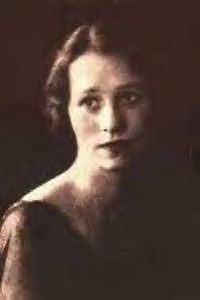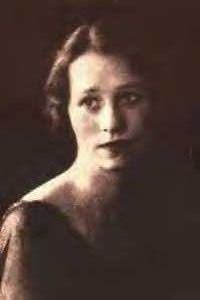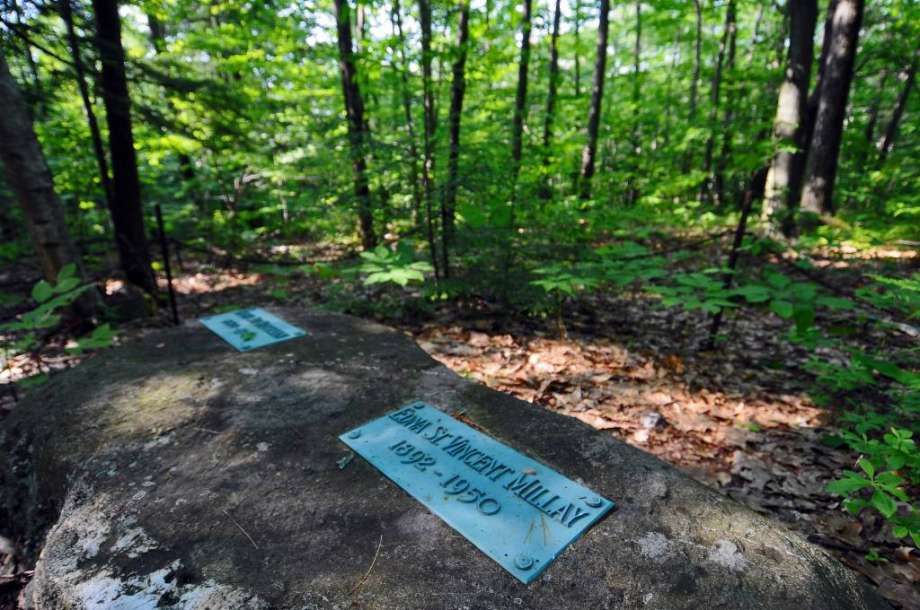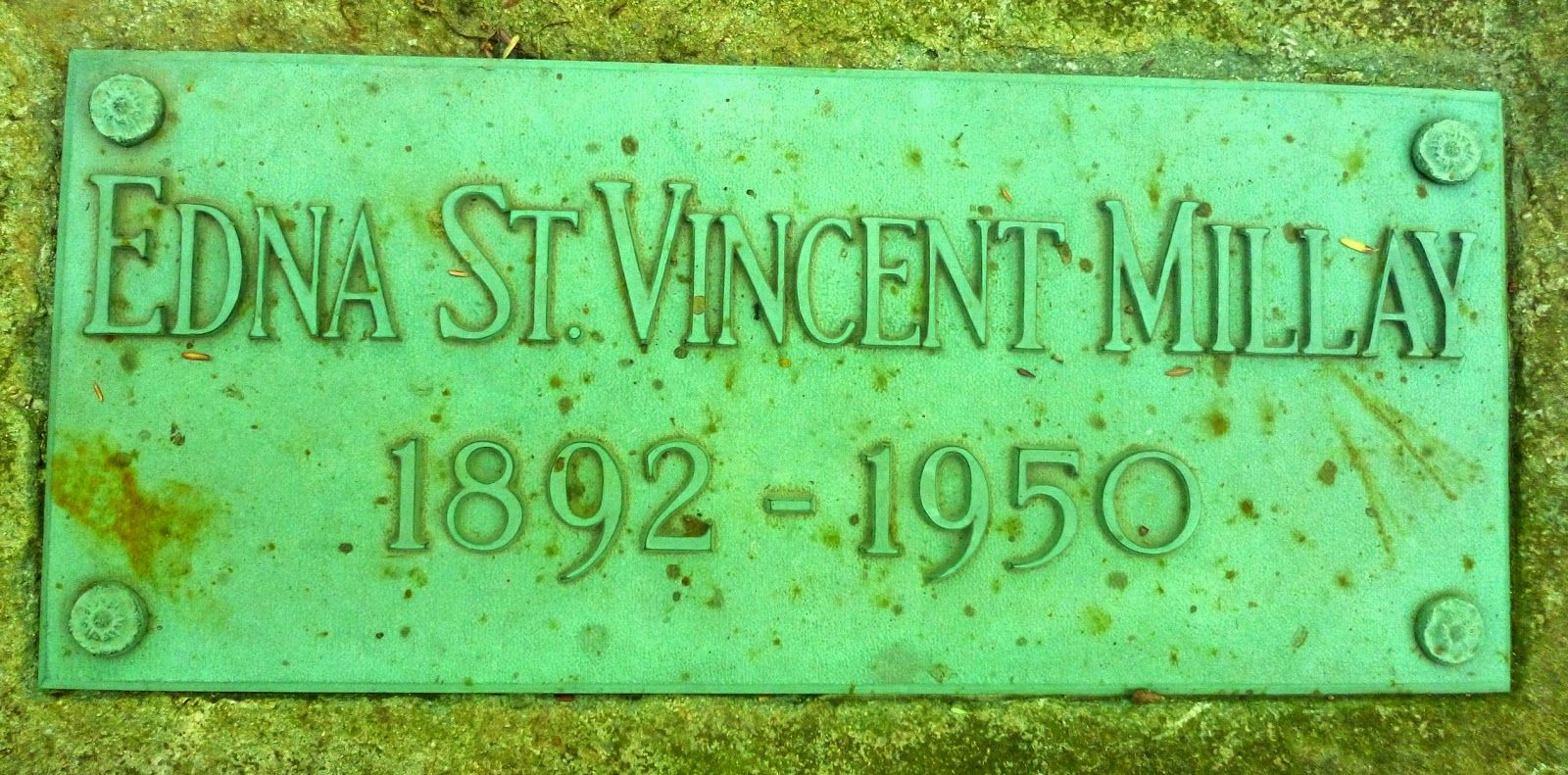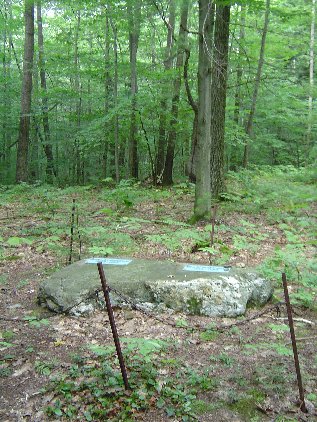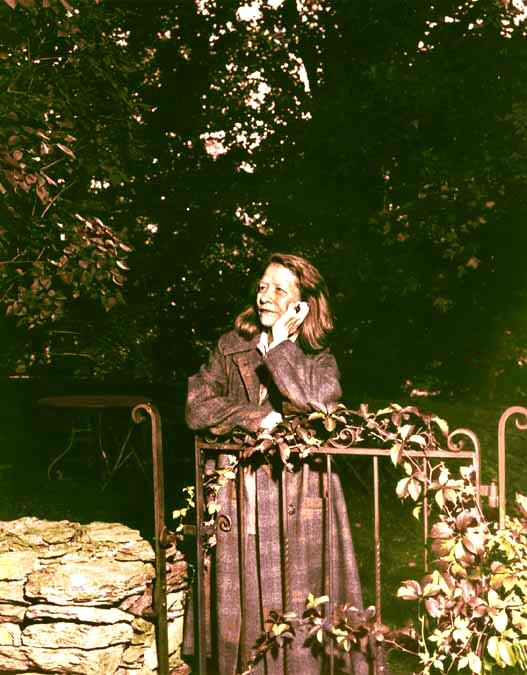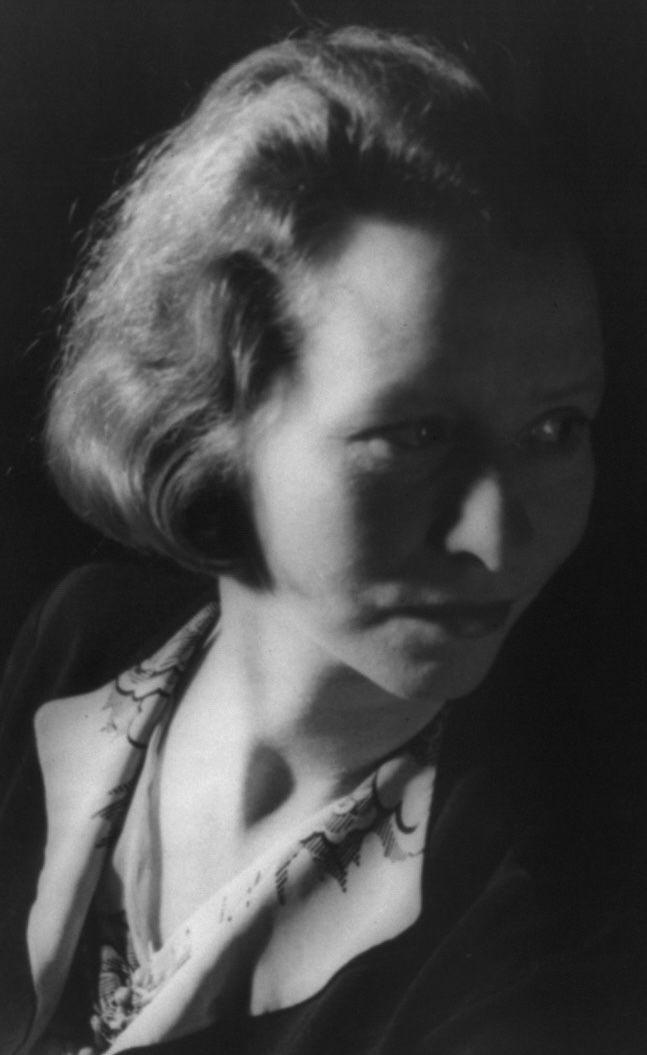Pulitzer Prize Recipient Poet. She gained recognition as an early 20th-century American poet, dramatist, and short story author. At the peak of her popularity, her books were being sold out within days of publication. Born one of three daughters of Cora Lounella, a practical nurse, and Henry Tollman Millay, a schoolteacher who would later become superintendent of schools, she lived in poverty after her parents' 1907 divorce. Her independent mother taught her to write poetry when she was four and play the piano at seven while living in poverty in Maine. By the age of 14, she had published her first poem, "Forest Trees," and from 1906 until 1910, continued to publish her poetry in children's magazines. The young poet was known to her family as Vincent, the name she preferred and would use throughout her life. Her poem "Renascence" received recognition after competing in a poetry contest. After taking classes at Barnard College in the spring of 1913, she received a 1914 benefactor's scholarship from the contest recognition to attend Vassar College. She studied literature, drama, and classic and modern languages. She was a good student who often had poems published in the "Vassar Miscellany" and acted in school dramas. Following the 1917 graduation from Vassar College, she and her sister Norma moved during the gaiety of the Jazz Age to New York City's Greenwich Village, where she attempted to begin a career in acting. She had a role in Floyd Dell's play "The Angel Intrudes." At the same time, she published her first collection of poems, "Renascence, and Other Poems." Politically, she was outspoken about her ideologies of a "free and equal society" but never became a Communist. Her liberal thinking impacted her lifestyle as well as her poetry. Under the pen name Nancy Boyd, she authored eight short stories for the magazine "Ainslee's" and one for "Metropolitan." By 1920, her work became more sophisticated, appearing in "Vanity Fair." In 1923, her poem "The Ballad of the Harp-Weaver" was awarded the Pulitzer Prize for poetry, and she was the first woman to receive this honor. During her life, she had several suitors with at least three marriage proposals, but none had longevity. In June of 1923, Millay married Eugen Boissevain, a Dutch businessman and widower, who supported her career. Eventually, the couple moved to an old isolated farm called Steepletop in the hamlet of Austerlitz in Upstate New York. On August 22, 1927, she and many others were arrested in front of the Massachusetts State House in Boston for protesting the execution of Nicola Sacco and Bartolomeo Vanzetti, Italian anarchists convicted of murder. On August 23, 1977, fifty years later, a proclamation was issued, effectively absolving the two men of the crime. Following this ordeal, she began reading tours, which she, a reserved private person, did not enjoy. Addressing world events, her 97-page collection, "Huntsman, What Quarry?" was published in May of 1939. During World War II, she wrote verses to sell war bonds and other poems, including one about the Nazi atrocity of destroying a Czech village, "The Murder of Lidice" in 1942. She was a fervent pacifist until she saw the horrors of World War II. By the end of the war, her husband's family had lost all their wealth. In 1943, she received the coveted Robert Frost Medal. In August of 1949, her husband died from a stroke following the removal of a cancerous lung. Her life was not free of health issues as she suffered constant pain from a spinal injury, from several bouts of depression, alcoholism, and headaches that impaired her vision. Suffering for over a year from depression related to grief, she was found dead in her home on the morning of October 19, 1950, with fatal injuries after a fall down a flight of stairs during the night. Apparently, she was climbing the stairs with sheets of poetry in her hands when she suddenly suffered a heart attack. Besides her 1923 Pulitzer Prize poem "The Ballad of Harp-Weaver," she received much respect during her career for her work, including an antiwar play, "Aria da capo" in 1919; a five-act drama, "The Lamp and the Bell" in 1921; the libretto composed for an opera, "The King's Henchman" in 1923; and the collections of poems "A Few Figs From Thistles" in 1920 and "Second April" in 1921. The much-used line "My candle burns at both ends" is credited to her from "A Few Figs From Thistles." Her volume of work, "Mine the Harvest," was published posthumously in 1954. Her edited personal letters were published in 1952.
Pulitzer Prize Recipient Poet. She gained recognition as an early 20th-century American poet, dramatist, and short story author. At the peak of her popularity, her books were being sold out within days of publication. Born one of three daughters of Cora Lounella, a practical nurse, and Henry Tollman Millay, a schoolteacher who would later become superintendent of schools, she lived in poverty after her parents' 1907 divorce. Her independent mother taught her to write poetry when she was four and play the piano at seven while living in poverty in Maine. By the age of 14, she had published her first poem, "Forest Trees," and from 1906 until 1910, continued to publish her poetry in children's magazines. The young poet was known to her family as Vincent, the name she preferred and would use throughout her life. Her poem "Renascence" received recognition after competing in a poetry contest. After taking classes at Barnard College in the spring of 1913, she received a 1914 benefactor's scholarship from the contest recognition to attend Vassar College. She studied literature, drama, and classic and modern languages. She was a good student who often had poems published in the "Vassar Miscellany" and acted in school dramas. Following the 1917 graduation from Vassar College, she and her sister Norma moved during the gaiety of the Jazz Age to New York City's Greenwich Village, where she attempted to begin a career in acting. She had a role in Floyd Dell's play "The Angel Intrudes." At the same time, she published her first collection of poems, "Renascence, and Other Poems." Politically, she was outspoken about her ideologies of a "free and equal society" but never became a Communist. Her liberal thinking impacted her lifestyle as well as her poetry. Under the pen name Nancy Boyd, she authored eight short stories for the magazine "Ainslee's" and one for "Metropolitan." By 1920, her work became more sophisticated, appearing in "Vanity Fair." In 1923, her poem "The Ballad of the Harp-Weaver" was awarded the Pulitzer Prize for poetry, and she was the first woman to receive this honor. During her life, she had several suitors with at least three marriage proposals, but none had longevity. In June of 1923, Millay married Eugen Boissevain, a Dutch businessman and widower, who supported her career. Eventually, the couple moved to an old isolated farm called Steepletop in the hamlet of Austerlitz in Upstate New York. On August 22, 1927, she and many others were arrested in front of the Massachusetts State House in Boston for protesting the execution of Nicola Sacco and Bartolomeo Vanzetti, Italian anarchists convicted of murder. On August 23, 1977, fifty years later, a proclamation was issued, effectively absolving the two men of the crime. Following this ordeal, she began reading tours, which she, a reserved private person, did not enjoy. Addressing world events, her 97-page collection, "Huntsman, What Quarry?" was published in May of 1939. During World War II, she wrote verses to sell war bonds and other poems, including one about the Nazi atrocity of destroying a Czech village, "The Murder of Lidice" in 1942. She was a fervent pacifist until she saw the horrors of World War II. By the end of the war, her husband's family had lost all their wealth. In 1943, she received the coveted Robert Frost Medal. In August of 1949, her husband died from a stroke following the removal of a cancerous lung. Her life was not free of health issues as she suffered constant pain from a spinal injury, from several bouts of depression, alcoholism, and headaches that impaired her vision. Suffering for over a year from depression related to grief, she was found dead in her home on the morning of October 19, 1950, with fatal injuries after a fall down a flight of stairs during the night. Apparently, she was climbing the stairs with sheets of poetry in her hands when she suddenly suffered a heart attack. Besides her 1923 Pulitzer Prize poem "The Ballad of Harp-Weaver," she received much respect during her career for her work, including an antiwar play, "Aria da capo" in 1919; a five-act drama, "The Lamp and the Bell" in 1921; the libretto composed for an opera, "The King's Henchman" in 1923; and the collections of poems "A Few Figs From Thistles" in 1920 and "Second April" in 1921. The much-used line "My candle burns at both ends" is credited to her from "A Few Figs From Thistles." Her volume of work, "Mine the Harvest," was published posthumously in 1954. Her edited personal letters were published in 1952.
Bio by: Linda Davis
Family Members
Advertisement
See more Millay memorials in:
Explore more
Sponsored by Ancestry
Advertisement
